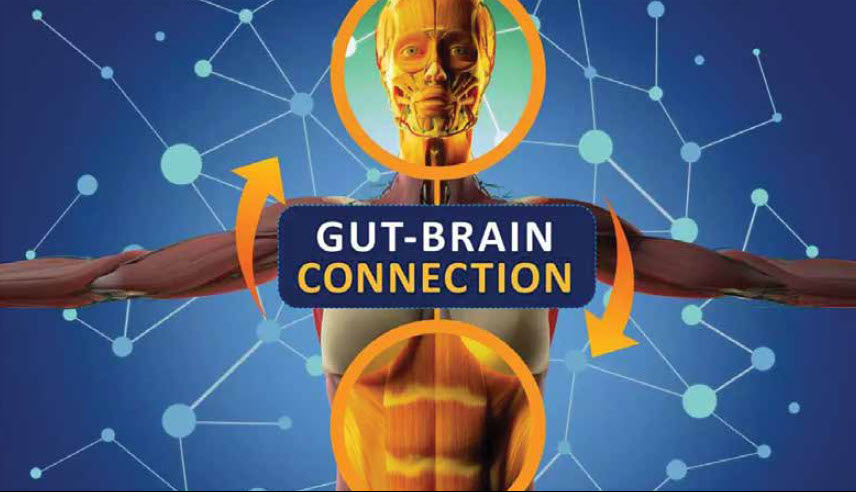The Second Brain – Mental Health Minute
 By: Lisa Philippart
By: Lisa Philippart
Have you heard the phrase, “Trust your gut,” which means to trust your instincts when making decisions? Or ever have that uneasy feeling in the pit of your stomach when you are anxious or something just doesn’t feel right? Do you get stomach pains when you feel depressed? Your gut is sensitive to emotions like anger, joy, worry, and sadness, and your brain can react to signals from your stomach. In fact, it turns out that the gut plays a huge role not only with our emotions, but in our judgments, overall health, and mental well-being.

The gut includes every organ involved in digesting food and processing it into waste. This includes the esophagus and stomach, small and large intestines, gall bladder, liver, and pancreas. The lining of your gut is often called the second brain, because it can operate on its own, and communicates back and forth with your actual brain. Your gut and brain are connected in two ways: physically and chemically. Physically, the vagus nerve controls messages to the gut, heart, lungs, and other vital organs. This nerve is the gut’s direct connection to the brain. Chemically, messages are passed between the gut and brain through bacteria, viruses, and fungi that live in the gut, called the gut microbiome.

The bacteria, viruses, and fungi that live in the gut may be beneficial, harmless, or harmful. So how is the gut microbiome related to mental health? First, there is a strong relationship between having mental health problems and having gastrointestinal symptoms like heartburn, indigestion, acid reflux, bloating, pain, and constipation and/or diarrhea. Second, having anxiety and depression can cause changes in the gut microbiome because of what happens in the body when it has a stress response. Third, animal research has confirmed that changes in the gut microbiome and inflammation in the gut can affect the brain, producing symptoms that look like Parkinson’s disease, autism, and anxiety and depression.
So, what does this all mean for those who struggle with mental and emotional challenges? We know that the human body interacts with the environment in complex ways. Your body creates panic attacks, anxiety, and other symptoms on purpose, as a meaningful reaction to what is going on around you. There is a good reason for your brain and mood to get your attention…so you can make a change. So stay with me here while I suggest that there is a correlation between inflammation and symptoms of mental illness. I am not proposing that there is a cause and effect, but rather a relationship.
When your body is in a state of inflammation, this can translate as “danger” to the brain and influence the neurochemical balance. For example, gut inflammation can impact the extremely sensitive feedback systems around stress hormones, like cortisol. The problem is that once triggered, inflammation can be repeatedly activated, signaling distress to the body and mind. This inflammation transfers information to the nervous system typically through the vagus nerve (remember the link from the gut to the brain?) Quite possibly, depression, anxiety, and a host of other symptoms of mental illness may be a complex product of chronic inflammation. You may have a “sick gut” that is a result of infection produced through a cortisol or other hormonal dysfunction.
The gut is the gatekeeper of inflammatory response, and houses a large portion of our immune system. Continuing down the gut-brain path, the natural healing process conclusion would be that if you learn to take care of your gut, you can improve your mental health. If this topic interests you, and/or you have found yourself saying, “Yes, this all makes sense to me,” then I encourage you to do further research on your own. There is a wealth of information on the gut-brain connection. So start to balance your moods by listening to your gut. You have the power to change.
By: Lisa Philippart
Licensed Professional Counselor